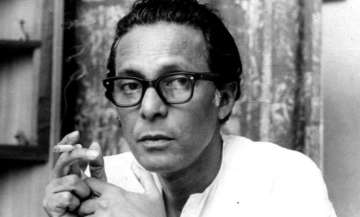Padmabhushan awardee Mrinal Sen often considered being one of the greatest ambassadors of Bengali parallel cinema on the global stage. Mrinal relished bucking the trend, and his films were silver screen adaptations of his firm social and political beliefs, eminent personalities and close associates said at the auteur's memorial meeting here on Saturday.
Legendary Bengali filmmaker, who is contemporary to Satyajit Ray, Mrinal passed away on December 30 last year. Sen did not believe that films needed a plot and it was never his intention to tell a story on the celluloid but to portray facets of human life, said prominent films makers, actors, and critics at the packed-to-capacity Gorky Sadan auditorium.
Also Read | When Mrinal Sen and Satyajit Ray duelled over films
"The very language of his films is a reflection of the person he was. He was a life-long idealist and believed in a specific school of thought of filmmaking. He could have taken the simplistic path to make populist films but he chose to stick to his style," said veteran Bengali filmmaker Tarun Majumder.
He recalled having several arguments with Sen on the art of filmmaking and film language but said their difference of opinions could never spoil the warmth of their personal relationship as Sen was someone who could take criticism positively.
Comparing his films with legendary filmmaker Satyajit Ray's creations noted Bengali film critic Samik Banyopadhyay said, unlike Ray, Sen did not believe in telling a gripping story with a beginning and an end to his audience as he felt using plots in a film further distances it from real life.
"The films he made were so close to real life and life's problems that it created a subtle yet prolonged sense of uneasiness in the minds of the viewers. When a director uses such treatment in his films it is natural that a large section of people would not like it much. Perhaps, that's why some of his films were not financially successful, but they left a mark in our mind," Bandyopadhyay noted.
Referring to an unpublished letter by Ray, he said the Academy Award winner wrote that Sen and some other contemporary directors lost out to him as he succeeded in telling a story through his films which the others couldn't.
Sen's son Kunal, who sinche childhood called his father 'Bondhu' (friend), narrated a number of incidents that showed his father as fun-loving and with a great sense of humour.
"He was more of a friend than a father. There was a lot of childishness in him. In fact, in my childhood, I often found him a little weird," he said tongue-in-cheek.
Actor-director Anjan Dutt, who began his career with Sen's Chaalchitra (1981), moderated the meeting where an audio-visual made by him on the late filmmaker was screened.
Leading lights of the Bengali film fraternity including veteran actress Madhabi Mukherjee and director Goutam Ghose said Sen never "deviated from his ideals".
Actor-turned-director Aparna Sen, who skipped the meeting due to illness, sent a written message, calling Sen "the youngest old man I have ever seen".
Physician-cum-Left activist Adhrishya Kumar, who was a Man Friday to Sen, recalled how he had helped in putting up embankments in a remote Birbhum tribal village with the MPs' Local Area Development Fund as a Rajya Sabha member.
"And what was more remarkable was the way he got involved with the project. He was always worried about the marginalised. His films were, in fact, the mirror image of his firm social and political beliefs. He really cared for the masses," said Kumar.
Condolence messages were sent from the Russian consulate and Deputy High Commission of Bangladesh.
(IANS Inputs)
For all the latest Bollywood updates, check out our Facebook page!
